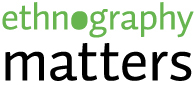Guest contributors form a really important part of the Ethnography Matters platform. We’d love to hear from you! You can reach us at ethnographymatters@gmail.com.
If you are interested in contributing, please start by taking a look at our about page, past guest posts, and themes that we’ve covered. Write a draft of your post and then make sure that the post reads well (get someone to sub-edit it for you, for example). The editors do this work as volunteers on crazy schedules so we aren’t able to do major editing on posts to improve readability. Finally, send a draft of your post for consideration to ethnographymatters@gmail.com. Please include your name, twitter handle, bio, website if you have one, and 2-3 sentences about your post and why you think it will be relevant for Ethnography Matters. Include links to other pieces of writing for a general audience (e.g. blog posts).
Our key requirements are that your posts tell a story and speak to the Ethnography Matters audience. For this reason, we do not tend to accept posts that have already been published for other audiences. There have been cases where we invite contributors to repost something that is perfect for the EM audience, and in this case we ask authors to write a new introduction for the Ethnography Matters audience. Here are two examples where we have done this before, John Payne’s ‘Teaching Ethnography For User Experience’ and Gabriella Coleman’s ‘Anonymous and I’.
If we accept your post, we will send you a WordPress invite and ask that you create a draft post and upload your picture (must be a headshot where we can see your face) and bio. We do not copy-edit posts but we do provide feedback to improve the shape and structure of the posts. Expect one to three rounds of revisions. Please take a look at past guest posts.
All posts should consist of at least one image at the beginning of the post (Flickr’s Advanced Search is a great place to find Creative Commons-licensed images!). We encourage the use of multimedia and visuals.
Licensing
All posts are licensed under the Creative Commons Attribution Non-Commercial Share-Alike 3.0 unported license. Authors retain copyright but the posts are licensed under the Creative Commons so that others are allowed to copy and publish the work elsewhere for noncommercial purposes, as long as they attribute the author and the site and use the same terms applied here.
For photograph/illustration licensing, please add a caption to the photograph with information about the author of the photograph as well as any license/copyright information using one of the following:
-
All rights reserved If you are using photographs/illustrations that you took/made and do not want them to carry the same license (i.e. CC BY NC SA) then you need to specify in the caption that they are ‘all rights reserved’ (this is because the whole site carries the CC license so we have to specify which content does NOT carry this license). See an example in this post.
-
Creative Commons licensed if you are using CC-licensed photographs from Flickr or elsewhere, then make sure you attribute the photographs properly, noting the author, the site where it was published and the license terms. See an example in this post.
-
Copyright with permission if you are using a copyrighted image with permission, then please make it clear who the copyright holder is and that you have gained permission
-
Copyright under fair use/fair dealing if you are using a copyrighted image under fair use/fair dealing terms, then make that clear as well (just talk to us about it because this can be a complex issue).
Some tips
If you have written a journal article or book that you would like featured, please write a new (summarized!) version that is friendly for a general audience and update your article with discussion that you did not cover in your article. For example, tell us if you have new thoughts about your data or something relevant to ethnographers. For example, when Jenna Burrell published her book Invisible Users, she wrote a post reflecting on the future of ethnographic monographs. Her post promoted her book but it also offered interesting reflections for the community.
All posts should be written in an accessible language, free of academic and industry jargon, and in a first person voice.
Keep in mind that our audience consists of ethnographers and non-ethnographers who work in industry and/or academia.
We ask that guest contributors monitor and respond to comments on their post because this is an important way for readers to engage in dialogue with you.
We also encourage guest contributors to be active on Twitter for the same reason.
We ask for a profile photo of your face because it is easier for readers to establish a relationship with the guest poster.
After accepting the author invite on WordPress and creating your draft for review, please take a look at this checklist before notifying the editors:
-
I have uploaded headshot to the post and placed at the very beginning of post. My face is fully visible. (Editors will use this picture in the editor’s note)
-
I have added all relevant url links.
-
I am confident that my post has been edited for grammar and spelling.
-
I have uploaded one high resolution image at the beginning of my post (all posts start out with an image).
-
I have uploaded my profile pic and bio to my WordPress account.
-
I have properly captioned and attributed my photos. (Please see contributors guidelines for proper licensing and attribution).


Trackbacks/Pingbacks
[…] Participate […]
[…] Participate […]
[…] Participate […]
[…] Participate […]
[…] Participate […]
[…] Participate […]
[…] Participate […]
[…] Participate […]
[…] Participate […]
[…] about data sharing, open access and broader accessibility issues? We’d love to hear from you. Contact us or share your comments […]
[…] Participate! […]
[…] Participate! […]
[…] Participate! […]